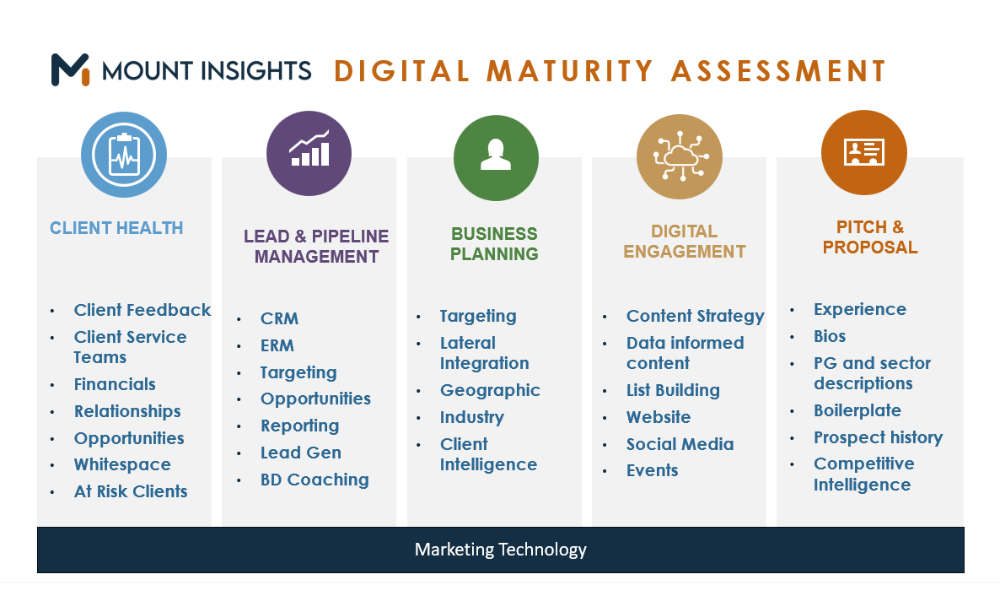

Digital Maturity Assessment
Without a clear roadmap and strategy, firms can waste $100Ks on software that doesn’t fit together properly, is difficult to use, and doesn’t match the firms culture, needs and strategy.
We recommend that firms take a step back and assess where they are today and where they want to be in next 12 – 36 months.
In today's digital-first environment, law firms must leverage data and technology to streamline their approach to business development and revenue generation. Traditional methods alone are no longer sufficient. Our Digital Maturity Assessment helps your firm navigate this complex landscape, providing insights to drive growth and efficiency.
Why a Digital Maturity Assessment?
Understanding your firm's current digital capabilities is crucial for making informed decisions about technology investments and process improvements. Our assessment provides:
A clear picture of your current MarTech ecosystem
Identification of critical improvement opportunities
A framework to educate stakeholders on essential functionality and gaps
Insights into high-impact areas for improvement
Support for software acquisition decisions
1. Client Health
Our Five Dimensions of Digital Maturity
1.Client Health
Client health is crucial for strengthening key client relationships and anticipating evolving legal needs. Our assessment evaluates your firm's capabilities in:
Create and maintain comprehensive key client plans
Implementing robust client health programs, including key client programs
Analyze financial data, market trends, and client feedback
Implement robust client health programs
Tailor legal services to support clients' growth objectives
Establish effective client feedback mechanisms, including:
Implementing formal processes for soliciting client feedback
Conducting regular client satisfaction surveys
Utilizing various feedback collection methods (e.g., online surveys, personal interviews)
Developing systems to track and act on feedback
Identify and manage at-risk clients through key metrics and early warning systems
2. Lead and Pipeline Management
Effective lead and pipeline management is critical for identifying, nurturing, and converting potential clients into billable engagements. We evaluate your firm's capabilities in:
Defining and implementing a structured lead management process
Utilizing Customer Relationship Management (CRM) and Enterprise Relationship Management (ERM) systems
Executing email marketing and social media campaigns
Analyzing and optimizing marketing and business development efforts
Key Components:
Lead Generation: We examine how your firm attracts potential clients through website optimization, content marketing, events, and networking strategies.
Lead Nurturing: Our evaluation focuses on your strategies for developing relationships with prospects through targeted email campaigns, valuable content distribution, and social media engagement.
Pipeline Management: We analyze your process for defining and tracking opportunities from initial contact to closure, including the systems you use to monitor pipeline health and velocity.
CRM and ERM Systems: We assess how you centralize and integrate client data across various platforms to identify and strengthen key relationships.
Email Marketing: Your strategies for list segmentation, automation for nurturing campaigns, and metric analysis are scrutinized to gauge effectiveness.
Social Media Campaigns: We examine your content strategy, engagement with potential clients and industry influencers, and methods for measuring social media's impact on lead generation.
Analytics and Optimization: We evaluate your lead scoring processes, performance measurement of lead generation efforts, and how you use data-driven insights to continually refine your strategies.
3. Business Planning
Strategic business planning is essential for proactive revenue generation. Our assessment examines your firm's approach to:
Setting high-level, firm-wide goals
Tracking progress and allocating resources across functional areas
Developing actionable plans for key clients, practices, industries, and geographies
Aligning marketing efforts with business objectives
Key Components:
Goal Setting: We evaluate how your firm establishes SMART (Specific, Measurable, Achievable, Relevant, Time-bound) goals for business development and marketing initiatives.
Resource Allocation: Our assessment examines your processes for distributing resources effectively across various business development and marketing activities.
Action Planning: We analyze your approach to creating detailed, actionable plans for key clients, practice areas, industries, and geographic markets.
Progress Tracking: We review your systems for monitoring and measuring progress against established goals and key performance indicators (KPIs).
Marketing Alignment: We assess how well your marketing efforts are integrated with and supportive of overall business objectives and plans.
Data-Driven Decision Making: We evaluate your use of data analytics and insights to inform and refine your business planning processes.
4. Digital Engagement and Content Strategy
A well-defined digital engagement and content strategy is crucial for showcasing expertise and establishing thought leadership. We assess your firm's proficiency in:
Producing high-quality, relevant content across various platforms
Optimizing content for search engines and addressing client queries
Leveraging email marketing, social media, and events for client engagement
Using analytics to measure the performance of digital initiatives
Key Components:
Content Creation: We examine your processes for developing and distributing valuable, relevant content that addresses your clients' needs and showcases your expertise.
SEO Optimization: Our assessment evaluates your strategies for improving search engine visibility and driving organic traffic to your digital properties.
Multi-Channel Distribution: We analyze your approach to disseminating content across various platforms, including your website, social media, email, and third-party publications.
Website Effectiveness: We review your website's user experience, functionality, and its role in supporting your overall digital engagement strategy.
Digital Event Management: We assess your capabilities in organizing and leveraging webinars, virtual conferences, and other digital events to engage clients and prospects.
Analytics and Performance Measurement: We evaluate your use of data and analytics to measure the effectiveness of your digital engagement efforts and inform strategy refinements.
5. Experience, Pitch and Proposals
Effectively managing and leveraging your firm's experience is vital for winning new business. We evaluate your firm's capabilities in:
Capturing and managing matter experience
Implementing centralized knowledge management systems
Generating tailored, professional-grade pitches and proposals
Integrating experience data with CRM and business development tools
Key Components:
Experience Capture: We examine your processes for systematically recording and categorizing your firm's matter experience and expertise.
Knowledge Management: Our assessment evaluates your systems for organizing, storing, and retrieving valuable institutional knowledge and best practices.
Proposal Generation: We analyze your capabilities in quickly producing customized, high-quality proposals that effectively showcase your firm's relevant experience and expertise.
Pitch Preparation: We review your processes for preparing compelling pitches, including how you leverage data and insights to tailor your approach to each prospect.
Integration with Business Development: We assess how well your experience management system integrates with your CRM and other business development tools to support opportunity identification and pursuit.
Analytics and Improvement: We evaluate your use of data analytics to measure the effectiveness of your pitches and proposals, and how you use these insights to continually refine your approach.
The Assessment Process
Our comprehensive questionnaire measures your firm's current state of digital maturity across these five dimensions. We analyze your responses, benchmark against industry standards, and provide actionable insights.
The resulting report serves as a roadmap for your digital transformation journey, highlighting strengths, identifying gaps, and recommending priority areas for improvement. This data-driven approach ensures that your technology investments and process improvements are strategic and aligned with your firm's goals.
Take the Next Step
Embark on your journey to digital maturity. Take the Digital Maturity Assessment and receive a customized report that is the first step in creating an overall digital transformation strategy.


